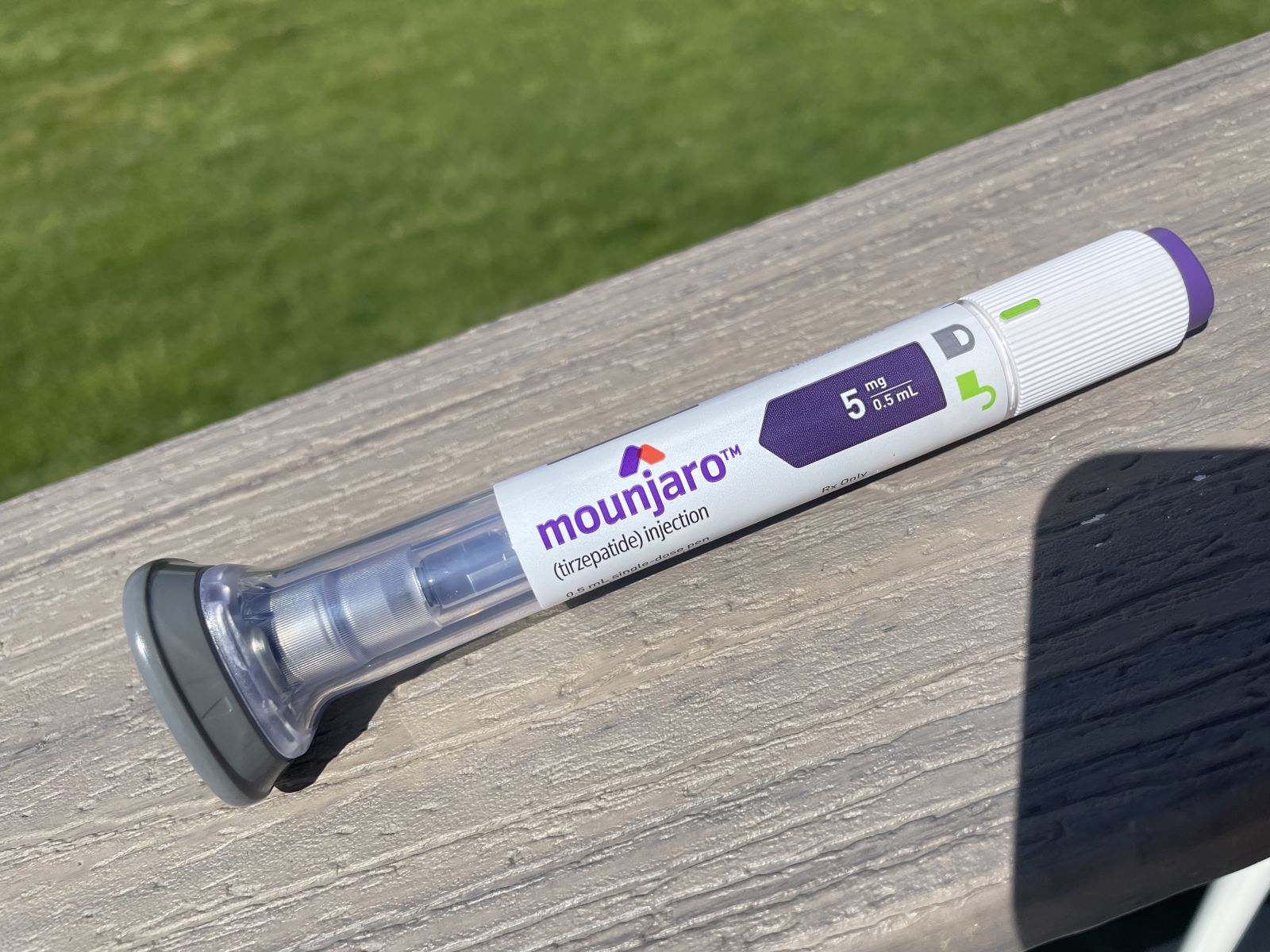New Trial Results Position Mounjaro for FDA Weight Loss Drug Approval
By Susannah Chen
 Mounjaro (tirzepatide) demonstrated not only unprecedented weight loss but also an array of impressive cardiometabolic benefits in patients with type 2 diabetes and overweight or obesity, according to the full results of a clinical trial released this week.
Mounjaro (tirzepatide) demonstrated not only unprecedented weight loss but also an array of impressive cardiometabolic benefits in patients with type 2 diabetes and overweight or obesity, according to the full results of a clinical trial released this week.
At the 2023 ADA Scientific Sessions in San Diego this week, researchers unveiled full results of the SURMOUNT-2 clinical trial evaluating tirzepatide for weight loss in adults with obesity or overweight and type 2 diabetes.
These results revealed not only an average weight reduction of as much as 15.7% but an array of equally astonishing secondary outcomes, reaffirming the medication’s position as the top weight reduction medication on the market.
In addition to an average weight reduction of 15.7% at the highest dose, the majority of participants saw other health benefits, including much see lower A1C levels; substantial reductions in fasting blood sugars, waist circumference, and body mass index; and improvements in cardiometabolic disease risk factors such as lipid levels, cholesterol, and blood pressure.
SURMOUNT-2 trial results
In Lilly’s SURMOUNT-2 global phase 3 clinical trial, 938 adult participants with obesity or overweight and type 2 diabetes took weekly treatments of either 15 mg tirzepatide, 10 mg tirzepatide, or placebo for 72 weeks. Study participants were generally representative of U.S. demographics, with 58% being female, 18% Black, and 41% Hispanic or Latinx.
Participants taking 15 mg of the medication achieved average weight reductions of 15.7%, losing up to roughly 34 pounds. Those taking 10 mg lost up to 13.4% or almost 30 pounds. In comparison, participants in the placebo group only lost an average of 3.3% or 7 pounds over the 72 weeks.
 Lilly also reported that nearly 80% of participants achieved a body weight reduction of more than 5%, and nearly 40% saw a reduction in body weight of more than 15%. In addition trial results found:
Lilly also reported that nearly 80% of participants achieved a body weight reduction of more than 5%, and nearly 40% saw a reduction in body weight of more than 15%. In addition trial results found:
- Nearly half of participants (46-49%) on tirzepatide were able to lower their A1C to what is considered normal levels of 5.7% or lower.
- Participants who received one of the tirzepatide doses also saw average body weight reductions of roughly 12-15%.
- Roughly 80% or more of participants on tirzepatide lost more than 5% of their body weight.
- Fasting blood sugars decreased by an average of 50 mg/dL.
- Triglyceride levels decreased by more than 27%.
- Fasting insulin decreased by an average of about 4 mlU/L.
FDA approval of tirzepatide for weight loss
At the ADA conference, investigators also confirmed when they expect the FDA to green-light tirzepatide specifically as a weight loss agent regardless of diabetes status. Tirzepatide, which is sold under the brand name Mounjaro, is currently approved as a diabetes drug for adults with type 2 diabetes. Last fall, the FDA granted the medication a “fast-track” designation for review to treat obesity and overweight.
“We anticipate it will be approved later this year,” said Dr. Timothy Garvey, lead researcher for SURMOUNT-2 and a professor of medicine at the University of Alabama at Birmingham.
FDA approval of tirzepatide for weight loss would position Mounjaro as a direct competitor to Novo Nordisk’s wildly popular weight loss drug semaglutide Wegovy (which is also available for diabetes management at lower doses under the name brand Ozempic). These two medications, known as GLP-1 agonists, have emerged as extremely effective weight loss and diabetes treatments, and have quickly gained star status as so-called miracle drugs for weight loss in celebrity and social media circles, leading to a surge in demand as well as a global shortage.
Unlike semaglutide (prescribed as Ozempic and Wegovy), which are in the class of drugs known as GLP-1 receptor agonists, tirzepatide is a dual GIP and GLP-1 receptor agonist, and a series of trials have already demonstrated that tirzepatide appears to be more effective than semaglutide. The most common side effects of this drug class are mild to moderate gastrointestinal issues such as nausea, diarrhea, and constipation, which affected roughly 20% of participants in the SURMOUNT-2 trial, especially when beginning treatment with the drug.
What SURMOUNT-2 trial results mean for diabetes
 “With any weight loss intervention, people who have obesity without diabetes lose more weight than when diabetes is there,” Garvey explained. “We really need dedicated studies in people with both obesity and diabetes…[to study] sufficient weight loss in that category of patients.”
“With any weight loss intervention, people who have obesity without diabetes lose more weight than when diabetes is there,” Garvey explained. “We really need dedicated studies in people with both obesity and diabetes…[to study] sufficient weight loss in that category of patients.”
He also emphasized that people with diabetes and obesity have two distinct diseases – both of which merit optimal therapy, a gap that tirzepatide could fill.
“We really want medicines in diabetes to get weight loss in the 15% range or higher,” he said. “We know at that degree of weight loss that’s sufficient to prevent a broad array of obesity-related complications.”
Long-term safety and effectiveness of tirzepatide and other incretin-based therapies
At a press briefing, Garvey also touched on a hot-button issue: the long-term use of tirzepatide and other incretin-based therapies that make up the category of second-generation weight loss drugs.
“These drugs have only been out for a couple of years. We don’t have long-term experience – this is data we need – and this is going to be developed by clinical experience over time,” he said.
He pointed out that additional benefits like cardiovascular improvements will hopefully be answered by ongoing additional trials.
About the SURMOUNT clinical trial program
The SURMOUNT clinical trial program has demonstrated promising results to date. Tirzepatide has been shown to be effective in helping people both with and without diabetes lose weight. A Lilly clinical trial last year in people with obesity but not diabetes, SURMOUNT-1, tested tirzepatide 5 mg, 10 mg, or 15 mg. The results, published in the New England Journal of Medicine, showed participants lost an average of 52 pounds (more than 20% of their weight) on the highest dose of tirzepatide.
Additionally, the SURMOUNT-1 trial found that 95% of people with obesity who also had prediabetes and took tirzepatide reverted to normal glucose levels. People also experienced improvements in their fasting glucose, A1C, blood pressure, waist circumference, and achieved normal levels of insulin while taking tirzepatide.
Photo credits: Julie Keller Heverly (Mounjaro); iStock (scale); University of Alabama (Garvey).








